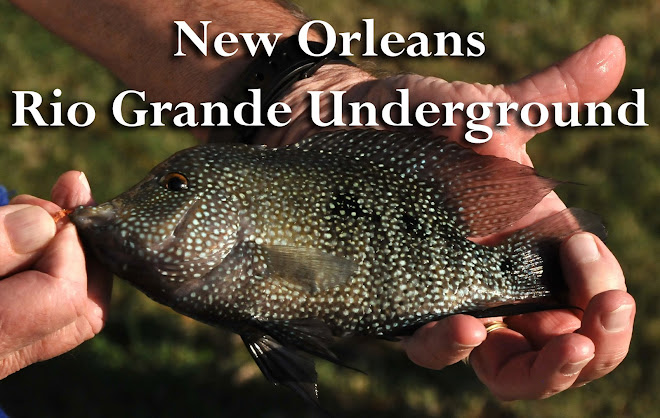Saturday, October 1st, 2011
8:00 AM till 2:00 PM
Sponsored by the New Orleans Fly Fishers
This year the tournament will be held at Lafreniere Park in Metairie, Louisiana. (More fish and a beautiful location!)
- The tournament is open to all members of any Louisiana fly fishing club
- No entry fee
- Lunch and drinks provided for invited guests
- Maps will be provided for approved fishing areas
Lafreniere Park is located just off Veterans Highway. From I-10 west take the Veterans Blvd exit. Turn left onto Veterans Blvd. The first traffic light will be Downs Blvd. Once in the park turn left at the first street.
For more information contact: Larry Offner - bloffner@gmail.com or Jimmy mayeux - jmayeux6@cox.net
Wednesday, September 7, 2011
Wednesday, August 19, 2009
This site is dedicated to the Rio Grande Perch (Cichlids) located in Bayou St. John, the lagoons of New Orleans City Park, Lafreniere Park and other waters in the Greater New Orleans Metropolitan area. You can contact us at... noriogrande@gmail.com
Friday, February 27, 2009
Typical N.O. Rio Grande Perch

Rio Grande Perch, Texas Cichlid
- Description:
- Cichlasoma is derived from cichla, the Greek word for "thrush." It means "resembling cichla." The word cyanoguttatum is also Greek and means "blue spotted." Rio Grande cichlid are distinctive in that they exhibit cream and turquoise colored spots, giving them a speckled look. Background color varies from very dark to light olive. Lighter colored specimens usually exhibit five dark vertical bars. Both dorsal and anal fins are long and tapered extending behind the caudal peduncle (fleshy portion of the tail). Unlike tilapia and most sunfishes, which typically have three spines on the anal fin, Rio Grande cichlids are equipped with five to six anal fin spines. Adult males may also develop a pronounced "hump" on the head which is not present in tilapia. Adults usually range up to about 6 inches in length.
- Life History
- Like most of its family, the Rio Grande cichlid is generally considered a warm-water fish, and is very sensitive to cold. In general, this fish does not survive at water temperatures below 49°Fahrenheit. The species may do well in heated water, and in spring-fed waters with constant favorable temperatures. Spawning occurs in early spring. Both parents protect their young, which feed primarily on small fish, insects and crustaceans. Adults are also known to consume large quantities of fish eggs when they are available.
Thursday, February 26, 2009
Recommended Tackle
 Uncle Larry's Recommendations!
Uncle Larry's Recommendations!- 2 to 5 wt. fly rod (anything larger just wouldn't be fun!)
- WF Floating fly line
- Nothing larger than a 4X tippet
- Some folks like to fish under a strike indicator (VOSI)
Wednesday, February 25, 2009
Known productive flies for Rios!
Tuesday, February 24, 2009
Subscribe to:
Comments (Atom)













